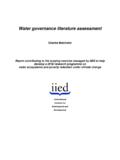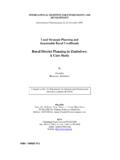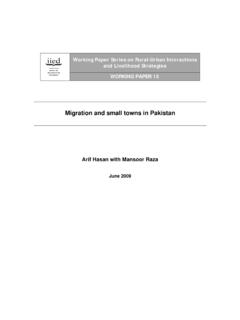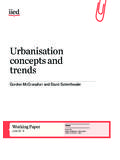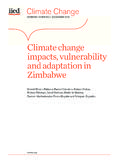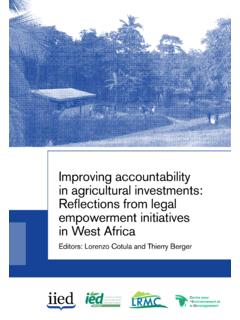Transcription of PUBLIC SECTOR ROLES IN STRENGTHENING CORPORATE …
1 PUBLIC SECTOR ROLES IN STRENGTHENING CORPORATE social responsibility :A BASELINE STUDY The world bank CORPORATE social responsibility PracticeThe CSR Practice advises developing country governments on PUBLIC policy ROLES andinstruments they can most usefully deploy to encourage CORPORATE social Fox, Halina Ward, Bruce HowardCorporate responsibility for Environment and Development ProgrammeInternational Institute for Environment and Development (IIED) October 2002 PUBLIC SECTOR ROLES INSTRENGTHENING CORPORATESOCIAL responsibility :A BASELINE STUDYP repared for the CORPORATE social responsibility PracticePrivate SECTOR Advisory Services Department, The world bank Tom Fox, Halina Ward, and Bruce HowardCorporate responsibility for Environment and Development ProgrammeInternational Institute for Environment and Development (IIED)
2 October 2002 List of tables and boxesiExecutive Summaryiii1 Introduction12A Classification of PUBLIC SECTOR Engagement in PUBLIC SECTOR CSR the National Level163 Understanding PUBLIC SECTOR Engagement in and and Investment Minimum and Civil Society Demand for pro-CSR goods and services234 STRENGTHENING PUBLIC SECTOR Action on CSR in Developing Awareness of the CSR Agenda and its Capacity to Shape the CSR a Stable and Transparent Environment for pro-CSR the Private SECTOR in PUBLIC Policy for Assessing Priorities and Developing Strategies26 Annex 1. PUBLIC SECTOR ROLES Identified in the Literature27 Annex 2. The Range of PUBLIC SECTOR Activities29 Annex 3. Alternative ways of classifying PUBLIC SECTOR activities31 References33 CONTENTSiTable 1 Classification of PUBLIC SECTOR ActivitiesTable 2 PUBLIC SECTOR RolesTable 3 Drivers of and Constraints to PUBLIC SECTOR EngagementBox 1 Proudly South AfricanBox 2 Business Partners for Development Box 3 Dialogue Through Partnerships.
3 Human RightsBox 4 Green Business Award, TaiwanBox 5 Presidential Speech and Annual CSR Week, the PhilippinesBox 6 Voluntary Principles on Security and Human RightsBox 7 Office on Labor Standards Development, ThailandBox 8 Cooperative Policy InstrumentsBox 9 Reforming Political Financing, ThailandBox 10 National Economic Development and Labor Council, South AfricaBox 11 Publish What You PayBox 12 King Report, South AfricaBox 13 Sao Paolo s Novo MercadoBox 14 social responsibility Agreements, GhanaBox 15 Niger Delta Development CommissionBox 16 Tax incentives for CORPORATE Donations: Law of Donations, ChileBox 17 Environmental Labels and Market Access, ColombiaBox 18 Green Markets Program, ColombiaBox 19 PUBLIC Procurement, TaiwanBox 20 Ecomark, IndiaBox 21 Certification in Sustainable Tourism Program, Costa RicaBox 22 National Responsible Tourism Guidelines, South AfricaBox 23 The Egyptian Environmental Policy ProgramBox 24 Environment-Friendly Company Certification, KoreaBox 25 Capacity Building on CSR Standards, IndiaBox 26 Mandatory Sustainability Reporting, FranceBox 27 OECD Guidelines in Dutch Official Support ProgramsBox 28 The Kimberley ProcessBox 29 Global Code of Ethics for TourismBox 30 New Partnership for African DevelopmentBox 31 Promoting Provincial Government Action on CSR.
4 British Columbia, CanadaBox 32 The Clean Development Mechanism in the Uganda Investment AuthorityBox 33 Egyptian Environmental Policy: A Response to Market Access ConsiderationsBox 34 Kaleen Label, IndiaBox 35 Private SECTOR Engagement in Policy DevelopmentBox 36 Workers as Drivers of PUBLIC SECTOR Engagement in CSRBox 37 Role of African Civil Society in CSRLIST OF TABLE AND BOXESiiiThis report categorizes and discusses the range ofroles that PUBLIC SECTOR agencies have played inproviding an enabling environment for corpo-rate social responsibility (CSR). The startingpoint is a broad definition of CSR that goes wellbeyond a more limited understanding of CSR asbeing about business activities that go beyondcompliance . A broader definition that considersthe overall potential commitment of business tosustainable development is better suited tounderstanding PUBLIC SECTOR ROLES in report classifies PUBLIC SECTOR engagementalong two axes.
5 First are four key PUBLIC sectorroles: Mandating Facilitating Partnering Endorsing The second axis reflects PUBLIC SECTOR activitiesunder 10 key themes of the CSR agenda: Setting and ensuring compliance with mini-mum standards PUBLIC policy role of business CORPORATE governance Responsible investment Philanthropy and community development Stakeholder engagement and representation Pro-CSR production and consumption Pro-CSR certification, beyond compliance standards, and management systems Pro-CSR reporting and transparency Multilateral processes, guidelines, and con-ventionsThere are examples of developing country publicsector initiatives in almost all of the categories inthis overall classification. Though the focus is oninitiatives that have taken place at the nationalEXECUTIVE SUMMARY level, the role of local and regional agenciesshould not be underestimated.
6 Undoubtedly arich body of experience so far unexplored exists at the subnational levels in many develop-ing contemporary CSR agenda is relativelyimmature, and the term CSR has not yet takenhold within many PUBLIC SECTOR agencies, in bothindustrial and developing countries. Many of theinitiatives highlighted in the report have not beenundertaken explicitly as pro-CSR initiatives but nonetheless have the potential to promotecorporate social responsibility . For example, theprimary aim of PUBLIC SECTOR activities that pro-mote exports of sustainably produced goods andservices might well be to earn foreign exchangeor to reduce the national economic impact of themarket access restrictions that can result fromCSR requirements incorporated in contracts forthe provision of goods and services.
7 PUBLIC sectoragencies that do not use the expression corpo-rate social responsibility are not necessarilydoing any less than those that do. The challenge is for PUBLIC SECTOR bodies toidentify priorities and incentives that are mean-ingful in the local and national context and tobuild on existing initiatives and capacities. Thereis a significant opportunity for PUBLIC SECTOR bod-ies in developing countries to harness currententhusiasm for CSR to delivery against publicpolicy goals and report assesses some important overalldrivers for PUBLIC SECTOR engagement in pro-CSRactivities in developing countries, as well as con-straints to engagement. Intergovernmental processes have begun todrive some promising initiatives, although muchremains to be done for intergovernmental initia-tives to realize their full potential as drivers ofivpro-CSR PUBLIC SECTOR activities in and investment promotion is a keydriver of pro-CSR initiatives by PUBLIC sectoragencies in developing countries.
8 Examples arenow beginning to emerge of PUBLIC SECTOR activi-ties in developing countries to build capacity oflocal producers to meet requirements of volun-tary CSR standards such as SA8000. But thereare also increasing suggestions that tools of CSRsuch as labeling or certification schemes may beviewed as non-tariff barriers to trade or anunwelcome imposition of foreign concernswhen applied to developing country the time being at least it is striking that thereis little evidence of developing country govern-ment engagement in processes to develop inter-nationally applied voluntary CSR CSR agenda brings a new focus to theneed to maintain a level playing field of mini-mum environmental and social standards so thatthe marketplace is able to reward higher stan-dards and innovation.
9 Anecdotal evidence sug-gests that the CSR agenda on child labor inindustrial countries has given renewed impetusto PUBLIC SECTOR labor inspectorates in somedeveloping countries to step up their complianceactivities. But lack of capacity to enforce mini-mum standards remains a significant problem inmany demand is a significant driver ofCSR practices by companies in high incomecountries. Yet stories of PUBLIC SECTOR successesin stimulating consumer demand for pro-CSR goods and services are hard to come by in thosemiddle-income countries with potential to devel-op substantial domestic green or ethical consumer key themes emerge for future work tostrengthen the CSR-related ROLES of PUBLIC sectoragencies in developing countries. Work to build awareness of the contemporaryCSR agenda within developing country agen-cies, including building understanding on theoverall drivers, key players, and effectivepressure points, as well as country-specificimpact assessments of the CSR agenda fortrade and investment promotion.
10 Any workin this area will need to be sensitive to theparticular importance of support for small,medium, and micro enterprises in manydeveloping countries. Initiatives that enable PUBLIC SECTOR bodies indeveloping countries to become effectiveplayers in setting the terms of the CSR debateand its associated standards. The CSR agendato date has been largely shaped by multina-tional corporations, consumers, investors,and governments based in developed coun-tries. Work to build a stable and transparent envi-ronment for pro-CSR investment, includingefforts to strengthen basic norms of social ,environmental, and economic governanceand their enforcement. Initiatives to engage the private SECTOR moredirectly in PUBLIC policy processes associatedwith delivery of PUBLIC goods (for example,national sustainable development or povertyreduction strategies).
